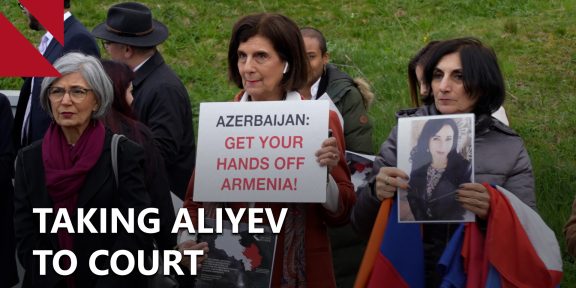By Mark Dovich
Prime Minister Nikol Pashinyan acknowledged Friday that a wide gulf remains between Armenia and Azerbaijan’s positions in peace talks, while recognizing that some progress had been achieved in negotiations this week in the United States.
“While the difference between the sides was 1 kilometer before, now it is 990 meters. It is progress, but there is still a huge difference,” Pashinyan told Radio Azatutyun, RFE/RL’s Armenian service.
The prime minister’s comments came after four days of talks in Washington between the foreign ministers of Armenia and Azerbaijan ended with only a joint statement noting that the meetings “advanced mutual understanding” despite the fact that “positions on some key issues remain divergent.”
According to Pashinyan, considerable differences remain over addressing the rights and security of Nagorno-Karabakh’s Armenians, the issue at the heart of the two countries’ decades-long conflict.
Nagorno-Karabakh’s more than 100,000 Armenians entered their 145th day under blockade Friday, less than two weeks after Azerbaijani border guards moved to install a checkpoint along the sole overland route connecting Nagorno-Karabakh with Armenia, dramatically escalating tensions.
Before that, self-styled Azerbaijani environmental activists, many of whom were later revealed to be connected with the Azerbaijani government, set up a roadblock on the Lachin corridor. The blockade has led to severe shortages of energy, food, medicine, and other essentials across Nagorno-Karabakh.
The talks in Washington did not “give us confidence that Azerbaijan recognizes” Armenia’s Soviet-era borders, Pashinyan added.
Those remarks contrast sharply with comments issued by Secretary of State Antony Blinken Thursday, who joined the negotiating teams at the talks’ opening and closing sessions and welcomed “significant progress” after “intensive and constructive” negotiations.
“With additional goodwill, flexibility, and compromise, an agreement is within reach,” Blinken said in a statement.
Decades of internationally mediated talks spearheaded by the Minsk Group, a body co-chaired by France, Russia, and the United States, have failed to reach a diplomatic solution to the conflict between Armenia and Azerbaijan. Since the end of the 2020 war in and around Nagorno-Karabakh, the European Union, Russia, and the United States have emerged as the main mediators, while the Minsk Group’s work has been largely frozen since Russia’s full-scale invasion of Ukraine last year.
Pashinyan told Radio Azatutyun that claims of competing “Western” and “Russian” peace treaty drafts are baseless.
Pashinyan is set to travel to Moscow next week. Kremlin spokesperson Dmitry Peskov told reporters Friday that plans are being made for Pashinyan to meet with Russian President Vladimir Putin.
















